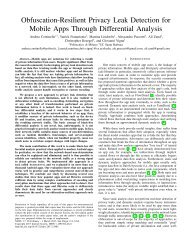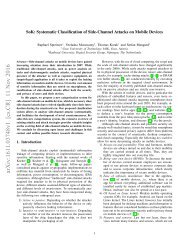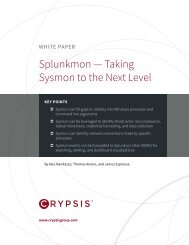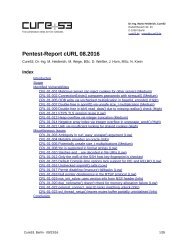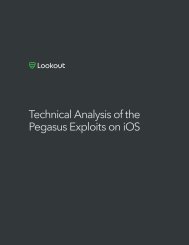Create successful ePaper yourself
Turn your PDF publications into a flip-book with our unique Google optimized e-Paper software.
Background<br />
As mobile phones continue to be tightly integrated into our personal and work lives, malicious actors are actively creating<br />
sophisticated applications that can run on victims’ devices without either their knowledge <strong>of</strong> the threat’s presence, or <strong>of</strong><br />
the actors’ intent. This can be seen in the diversity <strong>of</strong> threats that target mobile devices: from those that are financially motivated,<br />
such as adware, banking trojans, and SMS fraud, to those seeking personal information or corporate intellectual<br />
property. <strong>Spyware</strong>, a malicious application designed to retrieve specific information from an infected device without the<br />
victim’s knowledge, falls into the latter camp.<br />
<strong>Spyware</strong> applications <strong>of</strong>ten include the ability to extract a victim’s SMS messages, contact details, record their calls,<br />
access their call logs, or remotely activate a device’s microphone and camera to surreptitiously capture audio, video,<br />
and image content.<br />
In addition to these rich features, some spyware also has the equally important ability to remotely deliver the malicious<br />
application to a target device. This is a complex and technically challenging problem, as evidenced by the amount <strong>of</strong><br />
money private security firms and corporate bug bounty programs pay for zero-day exploits that facilitate this remote<br />
delivery.<br />
Two private security firms, Gamma Group and Hacking Team, both made headlines after media outlets revealed that the<br />
organizations developed mobile surveillance s<strong>of</strong>tware that has been sold to oppressive governments. These products are<br />
<strong>of</strong>ten very expensive and generally only accessible to well-funded attackers given the complexity involved in creating this<br />
kind <strong>of</strong> mobile spyware, and the fact that it includes zero-day exploits.<br />
The Israeli based NSO Group has managed to avoid the spotlight <strong>of</strong> the cyber security community despite being in operation<br />
for over five years. Founded in 2010 by Niv Carmi, Shalev Hulio, and Omri Lavie, NSO Group has publicly stated that<br />
it develops and sells mobile phone surveillance s<strong>of</strong>tware to governments around the world. It has claimed that its surveillance<br />
capability is undetectable with one <strong>of</strong> the founders stating, “We’re a complete ghost.” 2 Private equity firm Francisco<br />
Partners acquired NSO Group in 2014 for $110 million. The founders <strong>of</strong> NSO Group play in both the cyber <strong>of</strong>fense and<br />
defense spaces, having also founded the mobile security company Kaymera. 3<br />
2<br />
http://blogs.wsj.com/digits/2014/08/01/can-this-israeli-startup-hack-your-phone/<br />
3<br />
http://www.bloomberg.com/news/2014-09-29/israeli-entrepreneurs-play-both-sides-<strong>of</strong>-the-cyber-wars.html<br />
TECHNICAL ANALYSIS OF PEGASUS SPYWARE | 5










